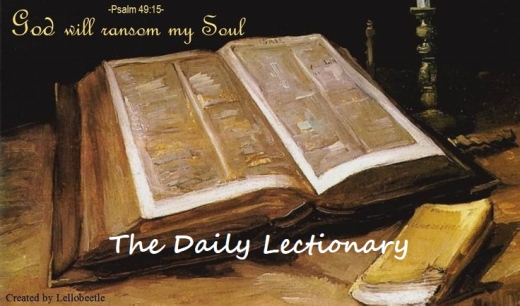 |
| Psalm 89:5-37; Genesis 35:1-15; Acts 10:44-48 |
The Daily Lectionary
MONDAY, January 13, 2020
(Revised Common Lectionary Year A)
God anoints David to be a son
5 The heavens praise your wonders, Lord,
your faithfulness too, in the assembly of the holy ones.
6 For who in the skies above can compare with the Lord?
Who is like the Lord among the heavenly beings?
7 In the council of the holy ones God is greatly feared;
he is more awesome than all who surround him.
8 Who is like you, Lord God Almighty?
You, Lord, are mighty, and your faithfulness surrounds
you.
9 You rule over the surging sea;
when its waves mount up, you still them.
10 You crushed Rahab like one of the slain;
with your strong arm you scattered your enemies.
11 The heavens are yours, and yours also the earth;
you founded the world and all that is in it.
12 You created the north and the south;
Tabor and Hermon sing for joy at your name.
13 Your arm is endowed with power;
your hand is strong, your right hand exalted.
14 Righteousness and justice are the foundation of your
throne;
love and faithfulness go before you.
15 Blessed are those who have learned to acclaim you,
who walk in the light of your presence, Lord.
16 They rejoice in your name all day long;
they celebrate your righteousness.
17 For you are their glory and strength,
and by your favor you exalt our horn.
18 Indeed, our shield belongs to the Lord,
our king to the Holy One of Israel.
19 Once you spoke in a vision,
to your faithful people you said:
“I have bestowed strength on a warrior;
I have raised up a young man from among the people.
20 I have found David my servant;
with my sacred oil I have anointed him.
21 My hand will sustain him;
surely my arm will strengthen him.
22 The enemy will not get the better of him;
the wicked will not oppress him.
23 I will crush his foes before him
and strike down his adversaries.
24 My faithful love will be with him,
and through my name his horn will be exalted.
25 I will set his hand over the sea,
his right hand over the rivers.
26 He will call out to me, ‘You are my Father,
my God, the Rock my Savior.’
27 And I will appoint him to be my firstborn,
the most exalted of the kings of the earth.
28 I will maintain my love to him forever,
and my covenant with him will never fail.
29 I will establish his line forever,
his throne as long as the heavens endure.
30 “If his sons forsake my law
and do not follow my statutes,
31 if they violate my decrees
and fail to keep my commands,
32 I will punish their sin with the rod,
their iniquity with flogging;
33 but I will not take my love from him,
nor will I ever betray my faithfulness.
34 I will not violate my covenant
or alter what my lips have uttered.
35 Once for all, I have sworn by my holiness—
and I will not lie to David—
36 that his line will continue forever
and his throne endure before me like the sun;
37 it will be established forever like the moon,
the faithful witness in the sky.”
God calls and blesses Jacob
35:1 Then God said to Jacob, “Go up to Bethel and settle there, and build an altar there to God, who appeared to you when you were fleeing from your brother Esau.”
2 So Jacob said to his household and to all who were with him, “Get rid of the foreign gods you have with you, and purify yourselves and change your clothes. 3 Then come, let us go up to Bethel, where I will build an altar to God, who answered me in the day of my distress and who has been with me wherever I have gone.” 4 So they gave Jacob all the foreign gods they had and the rings in their ears, and Jacob buried them under the oak at Shechem. 5 Then they set out, and the terror of God fell on the towns all around them so that no one pursued them.
6 Jacob and all the people with him came to Luz (that is, Bethel) in the land of Canaan. 7 There he built an altar, and he called the place El Bethel, because it was there that God revealed himself to him when he was fleeing from his brother.
8 Now Deborah, Rebekah’s nurse, died and was buried under the oak outside Bethel. So it was named Allon Bakuth.
9 After Jacob returned from Paddan Aram, God appeared to him again and blessed him. 10 God said to him, “Your name is Jacob, but you will no longer be called Jacob; your name will be Israel.” So he named him Israel.
11 And God said to him, “I am God Almighty; be fruitful and increase in number. A nation and a community of nations will come from you, and kings will be among your descendants. 12 The land I gave to Abraham and Isaac I also give to you, and I will give this land to your descendants after you.” 13 Then God went up from him at the place where he had talked with him.
14 Jacob set up a stone pillar at the place where God had talked with him, and he poured out a drink offering on it; he also poured oil on it. 15 Jacob called the place where God had talked with him Bethel.
Through Peter God calls Gentiles to be baptized
10:44 While Peter was still speaking these words, the Holy Spirit came on all who heard the message. 45 The circumcised believers who had come with Peter were astonished that the gift of the Holy Spirit had been poured out even on Gentiles. 46 For they heard them speaking in tongues and praising God.
Then Peter said, 47 “Surely no one can stand in the way of their being baptized with water. They have received the Holy Spirit just as we have.” 48 So he ordered that they be baptized in the name of Jesus Christ. Then they asked Peter to stay with them for a few days.
Optional parts of the readings are set off in [square brackets.]
The Bible texts of the Old Testament, Epistle, and Gospel lessons are from The Holy Bible, New International Version®, NIV® Copyright ©1973, 1978, 1984, 2011 by Biblica, Inc.® Used by permission. All rights reserved worldwide.
The Daily Lectionary is a three-year cyclical lectionary. We are currently in Year A. Beginning with the first Sunday of Advent in 2020, we will be in Year B. The year which ended at Advent 2019 was Year C. These readings complement the Sunday and festival readings: Thursday through Saturday readings help prepare the reader for the Sunday ahead; Monday through Wednesday readings help the reader reflect and digest what they heard in worship. Revised Common Lectionary Daily Readings, copyright © 2005 Consultation on Common Texts. www.commontexts.org
The Daily Lectionary for MONDAY, January 13, 2020
Psalm 89:5-37; Genesis 35:1-15; Acts 10:44-48








